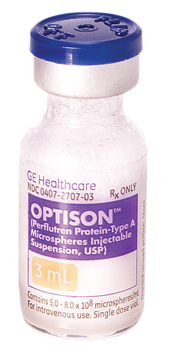
GE Healthcare Medical Diagnostics' ultrasound contrast agent Optison (Perflutren Protein-Type A Microspheres Injectable Suspension, USP) was reintroducted in the market. It is indicated for use in patients with suboptimal echocardiograms to opacify the left ventricle and to improve the delineation of the left ventricular endocardial borders. "We are excited to announce the reintroduction of Optison," said Kimberly Wolf, regional marketing leader-Americas, GE Healthcare Medical Diagnostics. "The product gives medical professionals an option in ultrasound contrast agents when they need to increase diagnostic accuracy by converting non-diagnostic echo studies to diagnostic images." Optison is a Food and Drug Administration (FDA)-approved ultrasound contrast agent available in a ready-to-use formulation, providing the benefits of fast preparation time, ease of use, portability, and flexible dosing. Optison was approved by the FDA in 1998. In June 2009, GE Healthcare was no longer able to supply Optison to the market due to manufacturing difficulties. Since that time, the company has conducted a thorough review of the manufacturing process and changes have been made to minimise any future disruptions to product supply. "Optison gives cardiologists, sonography professionals, cardiac catheterisation laboratory nurses, echocardiography laboratory staff and, most importantly, patients an additional option in ultrasound contrast agent selection," said Anthony N. DeMaria, MD, professor of medicine, Judith and Jack White chair in cardiology, University of California-San Diego School of Medicine. According to the Intersocietal Commission for the Accreditation of Echocardiography Laboratories, an estimated 10 million echocardiograms are performed in the United States each year. As many as 30% of patients receiving stress echocardiography may receive non-diagnostic or poor-quality images. Echocardiographic contrast agents can improve imaging. Clinical trials demonstrate that suboptimal echocardiograms can be converted to diagnostic examinations in 75% to 90% of patients. The American Society of Echocardiography recommends the use of contrast whenever two or more left ventricular wall segments are not seen on non-contrast images. In clinical studies supporting the marketing application of Optison, there was significantly increased left ventricular heart opacification and improved endocardial border delineation with Optison compared to non-enhanced echocardiograms. "I am pleased that Optison is back on the market because it offers an important tool for improving the accuracy and reliability of echocardiograms without unnecessarily exposing patients to ionising radiation or dye," said Steven B. Feinstein, MD, FACC, FESC, professor of medicine and director of echocardiography, Rush University Medical Center, Chicago. "By improving the accuracy of echocardiograms, the use of ultrasound contrast agents also avoids redundant downstream testing." "Optison, in a ready-to-use formulation, provides the benefits of fast preparation time, ease of use, portability and flexible dosing and serves as an option when there is a need to increase diagnostic accuracy " Optison is supported by more than 1 million administered doses and nearly 12 years of clinical use, with only 16 serious adverse events reported since 1998. Of the reported adverse reactions following the use of Optison, the most frequently reported were headache, nausea and/or vomiting, warm sensation or flushing and dizziness. Some adverse reactions have been identified during the postmarketing use of perflutren-containing microsphere products. Fatal cardiac arrests and other serious but non-fatal adverse reactions were uncommonly reported. Most of these uncommon reactions included cardiopulmonary symptoms and signs, such as cardiac or respiratory arrest, hypotension, supraventricular and ventricular arrhyZoom Huarache 2K4 Kobe














